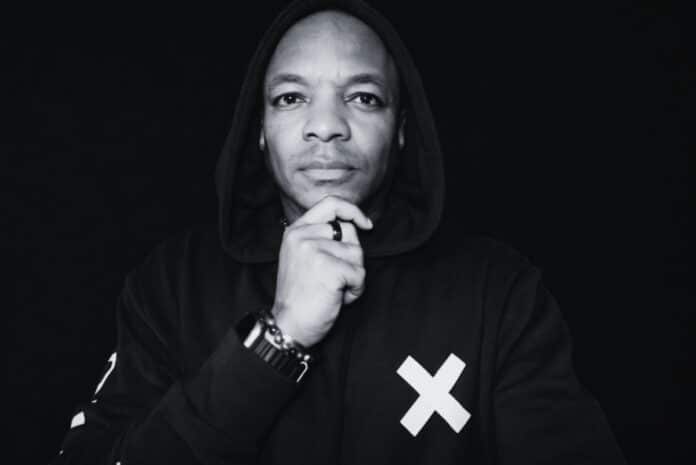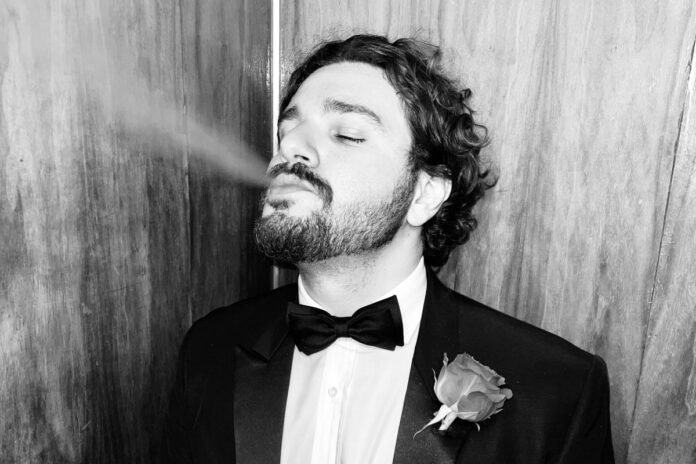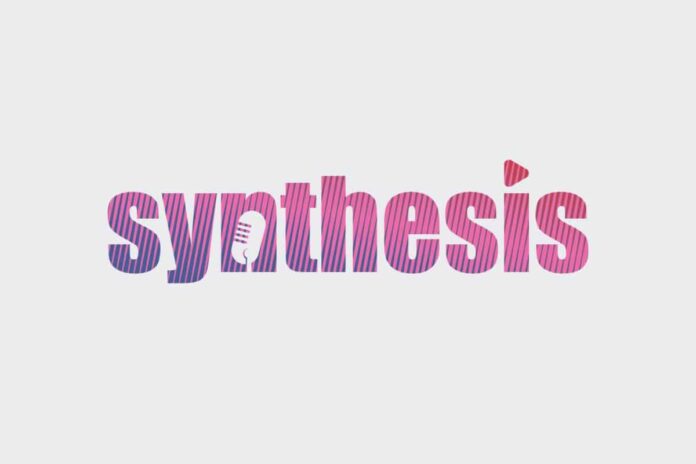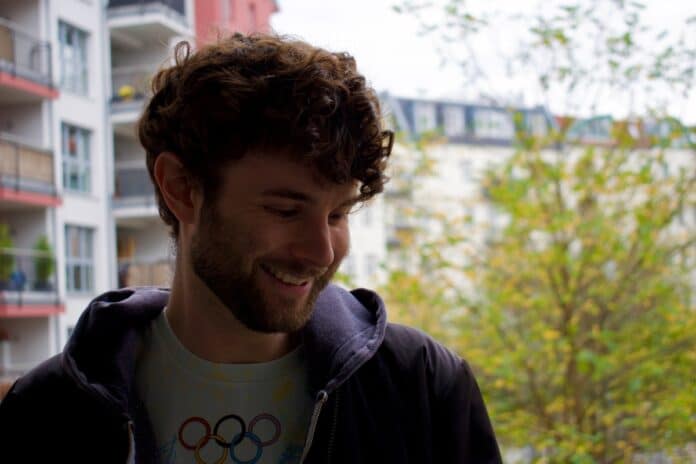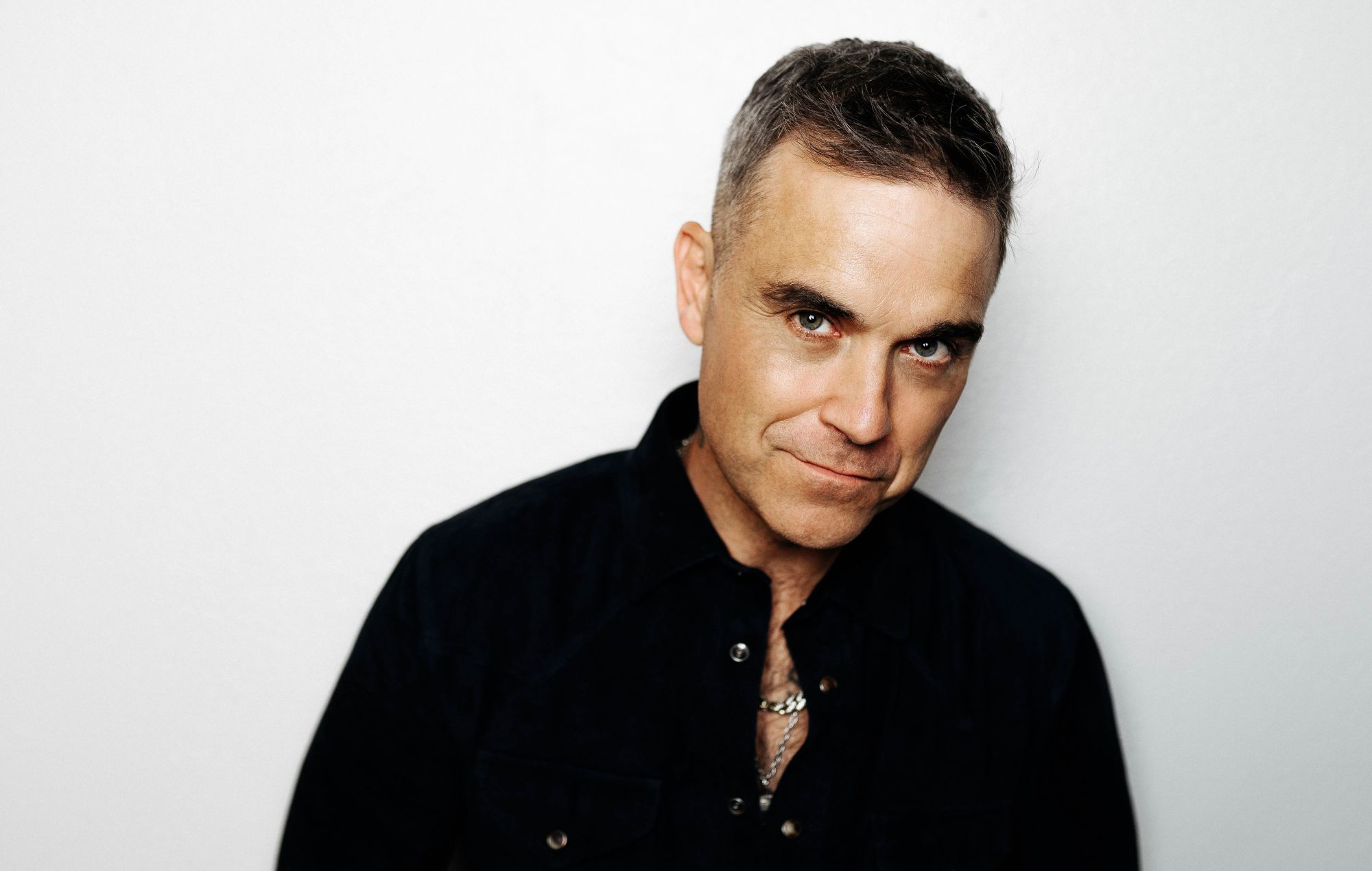
Robbie Williams on Damon Albarn, Morrissey and the dark side of Take That: “I have a cannon-full of quotes”
Robbie Williams is naked. He is literally naked, lying in crumpled white sheets in the bedroom of an Ibiza villa, stuffing his face with Pringles, and he is figuratively naked – as in the Merriam-Webster Dictionary definition: “devoid of concealment or disguise”. When it comes to Robbie, who is Zooming NME mid-holiday, this means stunningly unguarded quotes about the dark side of boybandom, the lowest point in his career and, of course, the masturbatory habits of his ‘90s rivals.
Our conversation has turned to Damon Albarn’s much-criticised assertion, made back in January, that “Taylor Swift doesn’t write her own songs” and that her co-writing “doesn’t count”. Robbie, who has co-written five of his seven Number One singles to date… erm – well, let’s just say that he doesn’t agree solo songwriting is more credible than collaboration.
“I think that when people say that,” he muses, “what they’re actually doing is having a wank about themselves. It’s true! You know, it’s like, why don’t you cut the middle man out – just get a few ribs removed and give yourself a nosh, you twat! Because all you’re doing is going, ‘Hey, I’m fucking amazing!’ Nothing good comes from it in any way, other than it’s a sort of dopamine hit for themselves, going, ‘Do you know – I’m a real one.’ OK. Good for you. Fuck off.”
Earlier in the interview, reflecting on the kinds of controversial quotes pop stars regularly gave in the ‘90s, he joked: “Oh, listen – I’ve got a cannon-full that just remain in my brain, that if it was the ‘90s or the early 2000s, I would be releasing them right now for you. But as it happens, you can’t do that shit anymore.” Yet when he breaks the stunned silence that follows his suggestion that the man who co-wrote ‘Country House’ should remove “a few ribs” and give himself a “nosh”, he grins: “There you go – there’s a ‘90s quote.” In goes another Pringle.
Robbie’s been raking over the past a fair bit lately. He’s gearing up for the release of ‘XXV’, a celebratory new album that marks a quarter-century since he left Take That to embark on what you can only concede has been a pretty successful solo career. ‘XXV’ features some of his best-loved songs, from daft-banger ‘Rock DJ’ to the scabrous ‘Come Undone’, re-recorded with lush orchestration performed by the Netherlands’ Metropole Orkest and arranged by his old songwriting partner Guy Chambers. How did it feel to look back over a dizzying 25 years?
“To be honest, all I thought about was: ‘Fuck me – that’s 25 tracks I’ve gotta sing in the next two weeks!” Crunch.
‘XXV’ also features a sparse new version of the acoustic guitar ditty ‘Nobody Someday’, previously a scratchy 2002 demo on which he thoughtfully dissects fame: “I get richer / While they take my picture / Taking my soul away.” Why include that relatively obscure Chambers team-up? “It’s a more ‘worthy’ version of a Robbie Williams song,” he replies, quickly adding: “He said, talking about himself in third person…”
Asked to define “worthy”, Robbie says it goes back to “that school of thought that pop music is a lower art form,” which saw him pilloried by his indie counterparts in the Britpop years, when it seemed inconceivable that a pop star could write a song as authentically personal as ‘Nobody Someday’: “I grew up in a time where that was never more prevalent, that sort of militant indie-ness: them against us. And by them against “us” I mean indie people against pop people, not pop people against indie people. ‘Cause it’s just like, ‘We’re just tryna have some fun!’”
This leads him to recall the indie snobbery he faced when he ‘ad it like an oligarch at a certain music festival shortly after absconding from Take That in 1995: “You know, me turning up at Glastonbury… I’m trying to put it into terms that won’t get me in trouble, but it’s like Putin turning up in Westminster. That’s a bit extreme, obviously, but it was like, ‘What the fuck is he doing here?’ If you got Niall Horan or Harry Styles or whoever you wanna say that goes to Glastonbury now, it’s like, ‘Yeah – that’s what they should be doing. Hope they’re having a great time!’ There’s no judgement. But back when I went, it was, like, A Thing.”
Harry Styles, of course, is someone who left a hugely successful boyband and soon stepped into the maelstrom of solo ultra-stardom. Does Robbie look at Styles, caught in the flashbulb of dazzling mega-fame, which so few people on Earth can understand, and see a kindred spirit?
“Something came up on my YouTube algorithm and I watched him talking in between one of his songs,” he says. “It was a throwaway thing – nothing exceptional, nothing out of the ordinary – but the way he phrased what he was saying reminded me completely of me. He was in Germany, talking about how, as a boy, he learnt to count to 20 in German by having a holiday in Spain and playing volleyball with a German kid. And then at the end of that, he went: ‘There you go – you can have that one for free.’ To this stadium full of people! I just thought: ‘That’s me, that is!’ Just wittering on, trying to fill a space and trying to entertain.”
you probably won’t catch Harry Styles challenging Liam Gallagher to a televised boxing match for a cash prize of £100,000 in the name of entertainment, as Robert Peter Williams did at the Brit Awards in 2000. Robbie’s feud with Oasis infamously began when Noel called him “the fat dancer from Take That”, a barb that couldn’t be more at odds with modern pop cultural sensibilities that champion niceness. Is Robbie envious that today’s pop stars don’t have to enter the gladiatorial amphitheatre he battled through?
“No,” he says, “I think that we lived in a more fun time. It was more heady, more controversial, more saying things for the sake of grabbing headlines. You know, it was like wrestling – and I love that. It was a fun aspect of the industry at the time… wearing your spite on your sleeve. Wearing your opinions on your sleeve, be they toxic or not, is just more interesting than what’s happening now, or is being allowed to happen… I kind of miss those days. Even though that was aimed at me, it’s like… we’re not allowed to do that shit anymore and it’s a shame.”
Wasn’t he hurt by Noel’s comment, though? “There was a lot of back-and-forth about a lot of different people,” he says, “and it wasn’t that I was hurt that it was said; it was just fucking annoying that it stuck. But, you know: Noel’s really good at that stuff. He’s said a lot of incredible quotes that stick. He’s a great comedic writer and he’s got that sort of brain for those things that cut through the chaff and stay around.”

If the insults were bad enough when he was on top, that was nothing compared to the onslaught Robbie would face when his career faltered. At the height of his commercial success, having performed to 375,000 people across three nights at Knebworth Park, he released 2006’s reputation-shattering ‘Rudebox’, a bizarre collection of comedy rap and synth-pop. The backlash was so visceral that he effectively quit showbiz for three years (and got really into UFOs).
“’Rudebox’ was sort of forced on people,” he points out, “because I was in my imperial phase,” though he also notes with a laugh: “It got the best review in the NME. 8/10. They were like, ‘Yes! This’ll collapse his career! We love this, Robbie – do more of these!’”
The problem, he says, arose in the gap between his view of the record and how it was received: “Look, there’s no font for irony. There’s no font for comedy. You’re in the studio, going, ‘Up your jacksie / Split your kecks’ and laughing with your mates, pounding each other with a fistpound, giggling, ‘That’s funny as fuck!’ And then you release it and nobody thinks it’s funny as fuck. They just think you are being completely serious. It’s just me messing around!”
In the best possible way, though, what was he thinking in actually releasing it?
“I guess it’s a touch of self-sabotage,” he admits, “whether that is conscious or unconscious. I think it’s probably a bit of both. But also I saw that album as a stepping stone, as a place to go to. It was just like, ‘I’ll put this out, and then I’d like to do some mad stuff to fulfil all of the things that I wanted to fulfil when I left Take That. And it was jumped on, and then it became something else, and I just panicked.”
“When people [criticise co-writing], what they’re actually doing is having a wank about themselves”
It’s true that, at 16 years’ distance, the album does look like an endearingly bold and idiosyncratic move. He could have just released another ‘Angels’, after all.
“What was in store after that,” he smiles, “was way madder than anything that was on that record – just like experimental and deranged and streams of consciousness. But I was like, ‘Oh fuck!’ I need to put something safe on the next one. I don’t wanna do… Oh, fuck it.’” He describes the albums he’s released since as “a menagerie of records where you’re trying to figure out how to keep the tanker full of gas and running, because you’re still really ambitious, and also how to fulfil your own quote-unquote ‘artistic needs’.”
Curiously, though, the ordeal hasn’t curbed the Robster’s appetite for experimentalism: during lockdown, he recorded vocals for Lufthaus, an EDM project masterminded by Tim Metcalfe, the Australian producer who co-wrote his Platinum-selling 2013 album ‘Take The Crown.’ When Robbie agreed to a few DJ gigs in Ibiza recently, he assumed he’d just be expected to spin the tunes and enjoy a brief respite from pop stardom. It didn’t work out that way.
“The first gig I did,” he says, “was 2000 people screaming, stood still, staring at the stage. I was like, ‘Oh… fuck! I’ve still got to entertain them! Shit!’ It was so weird. I was dancing and smiling like a loon, and then I got my Mac on the stage. I was Googling, ‘What do garage MCs say?’ It looked like I was setting up the next track, but I wasn’t. I’d get on the mic and go” – he puts on an authoritative DJ voice – “‘Inside! This one’s for the ladies! Watch for the drop!’” I was actually just reading it off the screen.”
it’s hard to imagine one of the biggest pop stars in the world being allowed to release ‘Rudebox’ now, given that acts are much more closely managed and looked after in the modern landscape than they were in, say, Take That’s day. The former members of One Direction, for example, have seemed more comfortable with fame than Robbie’s band, whose initial run ended in acrimony after he lambasted them in the press while grappling with addiction and other mental health issues.
“We don’t know the story yet,” he parries. “Only because I was full of hatred and vitriol when I left Take That, and drunk and high, was I willing to tell people my feelings and my thoughts. If you look at the whole of Take That, you’ve got Mark Owen, who’s been to rehab – he’s had his problems. You’ve got me and my obvious problems; Jason, who can’t be in the band anymore due to fame just fucking you up; Howard, who contemplated committing suicide when he left the band; and Gaz, who’s had his problems with the weight gain and the agoraphobia. I’m sure that in eight or nine years, you could pick out all of One Direction and label them with very similar aspects of how they have dealt and felt, being in that kind of machine. It’s fascinating what it does to people.”
Robbie has co-written two songs about the downfall of superstars ruined by celebrity: ‘Morning Sun’, which partly addresses Michael Jackson’s death, and ‘Advertising Space’, which laments the fate of Elvis Presley. At the height of his fame and addiction, did he fear he might meet a similar end?
“Me turning up at Glastonbury in 1995? It’s like Putin turning up in Westminster”
“No,” he says after a pause, “I didn’t. The good thing about me is I will listen to help. I’ve always felt there was something inside worth saving, and I’ve always wanted to be saved. When it comes to being delusional about other things, I am, but when it comes to being delusional about addiction and my own mental health, I don’t suffer with that. It was like, ‘Oh, this is out of control and these people are putting their hand out to save me and I’ll grab that hand.’ I do know that an awful lot can’t be helped, and exclude people that come to save them. I don’t wanna be in that kind of pain.”
Whatever great pain Robbie Williams may have experienced, he has poured into enduring pop songs, as ‘XXV’ attests. It’s arguable, in fact, that he doesn’t get enough credit as a songwriter (though don’t tell Damon Albarn).
“If you break down the maths of what I’m doing musically on a song,” he says, recognizing the point, “I do the same thing that Morrissey does. I’m not saying in any way, shape or form that I’m as good as or better than Morrissey, I’m just saying: I do the same thing. He sings to melody and puts a lyric to it. Same with Elton – he does it the other way around. It’s only annoying when there’s disrespect brought to it. I’m not bothered, but if it’s levelled against me that I don’t [write] or it’s ‘his songwriters’, then I’m like, ‘Fuck you’.”

Luckily, the legacy speaks for itself. As our time together runs down like that stack of Pringles, he reveals excitement at the upcoming Netflix documentary about his life and his much-publicised biopic Better Man, which is currently in production. And there’s another new album: he recently teased a ‘90s-themed record that’s reportedly guitar-based, but now suggests it’s taken a mysterious new direction. Robbie season approaching.
“I don’t feel any less ambitious than I did when I was 27,” he says. “Mind you, I always give myself future jeopardy in my own mind about this whole thing collapsing. What I actually thought, on the last night of Knebworth, was, ‘Well – that’s it, then. It’s all downhill from here…’”
When NME suggests that doesn’t quite seem to be the case, given all those new projects on the horizon, he smiles: “Well, listen: it’s a slow decline, and I would like the decline to be even slower.”
– ‘XXV’ is due for release on September 9 via Columbia Records

